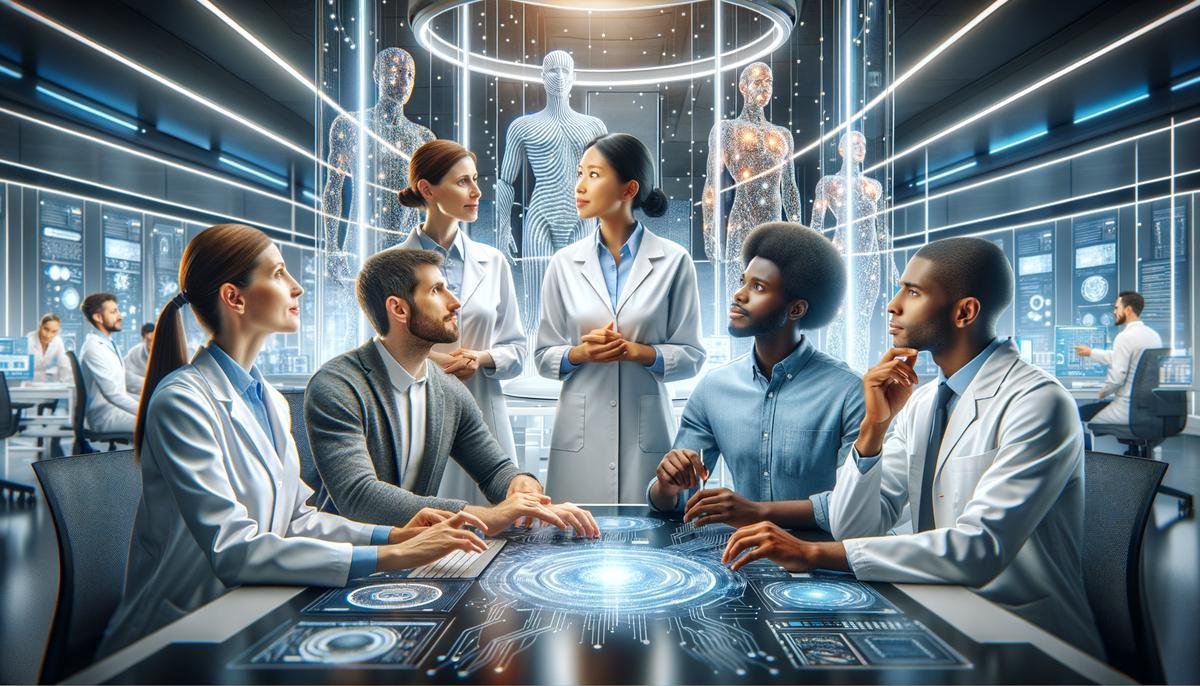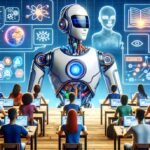Ginkgo Bioworks stands at the intersection of biotechnology and artificial intelligence, pioneering a future where the engineering of microorganisms opens new avenues for solving some of humanity’s most pressing challenges. This journey into the synthesis of biology and technology reveals a landscape where innovation is not just welcomed but necessary for progress.
Ginkgo’s AI Integration
Ginkgo Bioworks uses AI and machine learning to make the design of microorganisms more precise. They’ve partnered with Google Cloud to leverage its computational power and apply state-of-the-art large language models (LLMs) across Ginkgo’s projects. This aims to accelerate the discovery and development of new biological products.
AI helps in organism design by analyzing vast biological data to identify patterns and possibilities in the genetic code. Predictive models enable Ginkgo to streamline the organism engineering process. This predictive capability extends to areas like sustainability, where Ginkgo is designing yeast strains that produce dairy proteins without cows, potentially reducing water and land use1.
Ginkgo’s Foundry and upcoming Biofab1 are AI-powered facilities that combine biology and computing at scale. They increase production capabilities using algorithms and data. Even the defense sector recognizes the value of biotechnology’s AI-driven advances. Ginkgo is working with DARPA to develop materials that interact with ice in unique ways, suggesting potential de-icing solutions for the military and beyond.
The Ginkgo Technology Network, spanning over 25 partnerships, integrates AI deeply with biology. Partners contribute expertise in areas like AI platforms for genetic medicines and nano-tech engineering for drug delivery. This network leverages AI to drive projects that once seemed far-fetched into reality.
Ginkgo’s AI strategy aims to program biology with the precision and predictability of a computer. Every partnership and project harnesses AI’s potential to transform how we approach biology and tackle complex challenges. Ginkgo Bioworks is at the forefront of this bold future.
Ginkgo’s Technology Network
The Ginkgo Technology Network brings together diverse players in biotechnology and AI to accelerate biotech R&D through collective innovation. The network includes firms specializing in:
- Non-viral gene delivery systems
- Machine learning applications
- And more
This multidisciplinary collaboration fuels innovation by integrating computational expertise with experimental biotechnology.
The network’s impact is significant. It breaks down traditional silos in the R&D landscape, enabling advancements in genetics and AI to work together. This cross-pollination approach tackles complex challenges holistically, whether it’s refining genetic medicines or addressing environmental issues through synthetic biology.
The Ginkgo Technology Network also offers cost-effective acceleration of R&D timelines, enhancing the market potential of innovations. This benefits investors, stakeholders, and society as a whole by bringing solutions closer to reality in areas like healthier foods, greener materials, and disease-fighting strategies.
The network exemplifies the power of shared ambition and cooperative ingenuity in shaping a biotech-enabled future. As the network grows, its impact promises a renaissance in solving biological puzzles for the benefit of all.

Synthetic Biology Applications
Ginkgo Bioworks is reshaping the world through synthetic biology, with applications spanning:
- Agriculture
- Pharmaceuticals
- Sustainability
- Material science
In agriculture, Ginkgo designs microbes that enhance plant growth and provide natural pest protection, promoting sustainability and reducing the environmental impact.
In the pharmaceutical realm, Ginkgo navigates the genetic landscape to create novel therapeutics and vaccines. The DARPA ICE program showcases their ability to design proteins that interact with ice, enabling stable vaccines in extreme cold or new therapeutic formulations.
Ginkgo’s synthetic biology also addresses sustainability challenges. Lab-grown dairy proteins offer an alternative to resource-intensive traditional dairy production. Precision fermentation minimizes waste and maximizes efficiency in production processes2.
Beyond consumables, Ginkgo engineers materials such as biodegradable plastics and bio-based dyes, contributing to a more sustainable society. Each project aligns with the principles of sustainability and efficiency.
Ginkgo Bioworks demonstrates the transformative potential of synthetic biology across diverse industries. By mastering the language of DNA and rewriting the rulebook on production and invention, Ginkgo is building a future where technology and nature work together. The possibilities are vast as Ginkgo engineers a better tomorrow through synthetic biology.
Challenges and Criticisms
What Challenges and Criticisms Does Ginkgo Face?
Ginkgo Bioworks, a leader in synthetic biology, faces several challenges and criticisms. Foremost among these are concerns about its valuation, scalability, revenue model, and financial strategies.
Ginkgo’s valuation has raised questions, as it is based largely on potential rather than current earnings. Skeptics argue that such valuation may be premature for a company in an emerging field.1
Scaling up biologically-engineered production to meet industrial demands is another significant challenge. Critics question whether engineered microorganisms can compete with established petrochemical production in terms of cost and scale.
Ginkgo’s revenue model, which relies heavily on royalties, partnerships, and equity stakes in spinout ventures, also raises concerns about the sustainability of revenue streams and whether investment in spinouts generates new wealth or simply circulates capital.
Responding to these challenges, Ginkgo Bioworks positions itself as a pioneer navigating the uncertainties of the biotech frontier. The company aims to address skepticism, learn from criticism, and overcome challenges as it works towards its vision of a bioengineered future.
Future of Biotech Manufacturing
Shaping the Future of Biotech Manufacturing: Ginkgo Bioworks’ Vision
Ginkgo Bioworks envisions a significant shift in biotech manufacturing, moving away from traditional methods towards synthetic biology solutions. By designing and optimizing organisms to produce various substances, Ginkgo aims to create a more sustainable and innovative manufacturing landscape.
Synthetic biology is at the heart of Ginkgo’s approach. Instead of relying on naturally occurring compounds, the company engineers microorganisms to produce desired products, from fragrances to medicines. This method has the potential to reduce environmental impact and increase efficiency compared to traditional manufacturing processes.2
Ginkgo’s vision has implications for sustainability, as engineered organisms could reduce waste, lower carbon emissions, and minimize the need for toxic chemicals. By partnering with companies across industries, from agriculture to pharmaceuticals, Ginkgo seeks to catalyze innovation and reshape manufacturing practices.
However, this vision is not without challenges. Concerns about scalability, technological hurdles, and market adoption persist. Ginkgo must navigate these challenges while promoting a mindset shift that embraces biology as a valuable tool for innovation and sustainability.

Ginkgo Bioworks represents the intersection of synthetic biology and technological innovation, working towards a future where engineered microorganisms provide sustainable solutions across industries. The company’s work has broad implications for society, demonstrating the potential of synthetic biology to address complex challenges.




